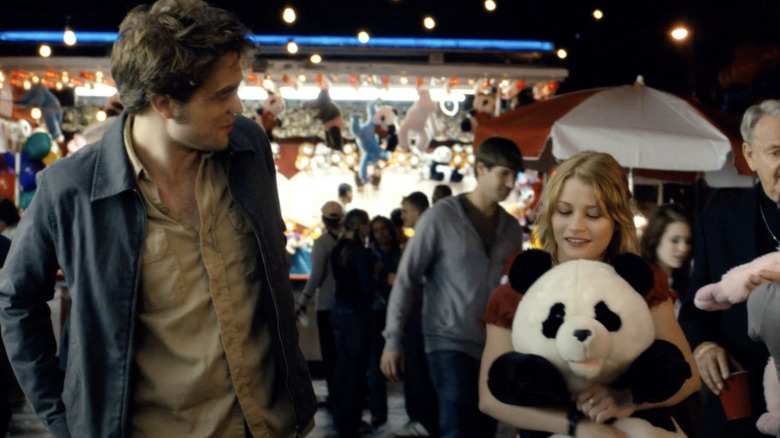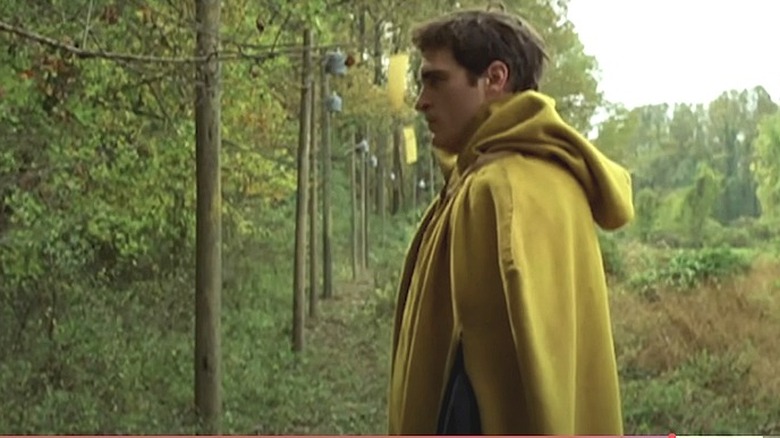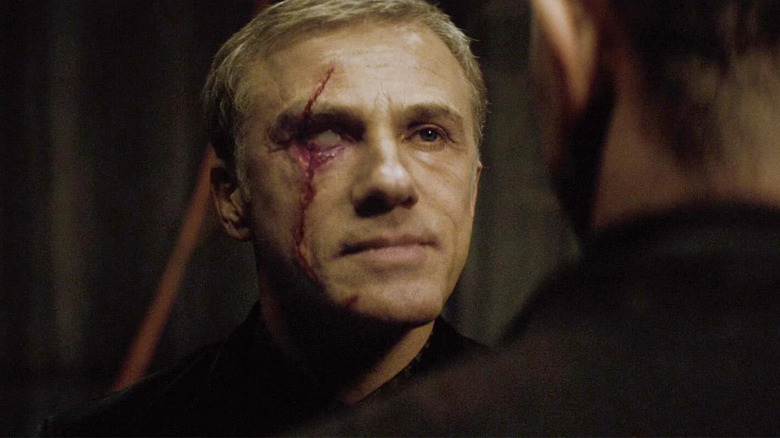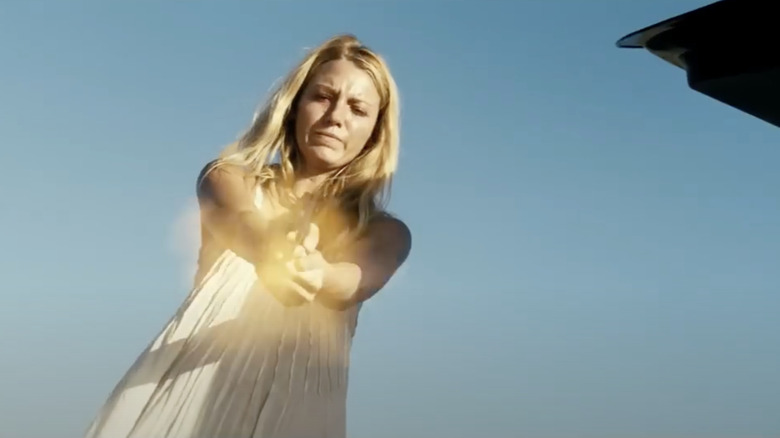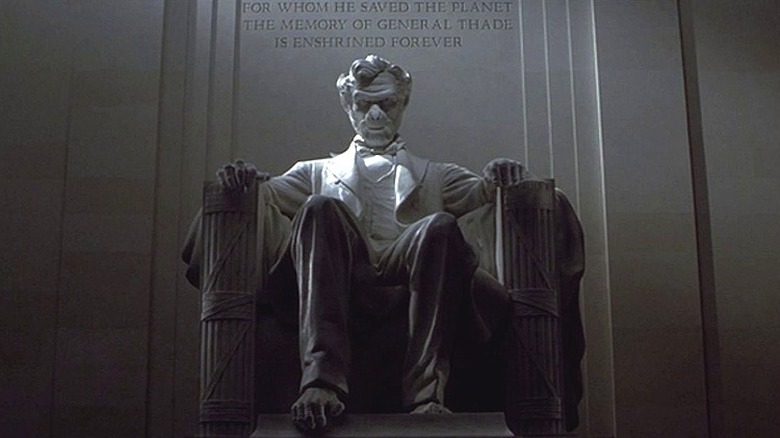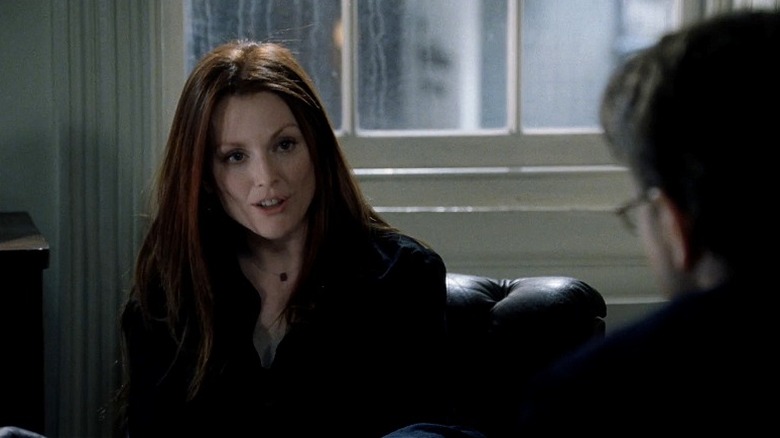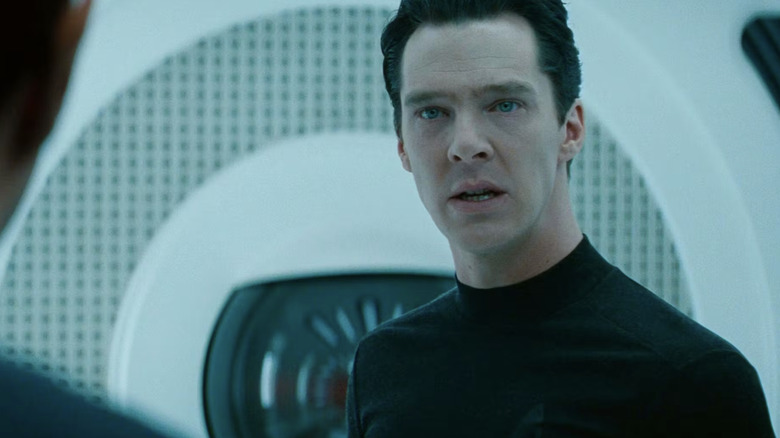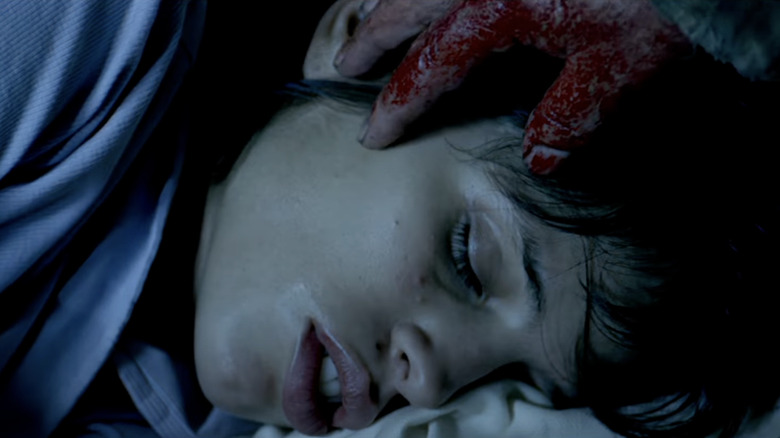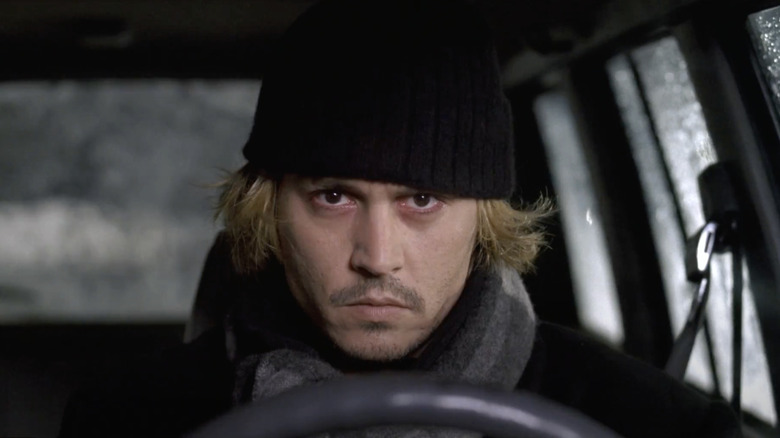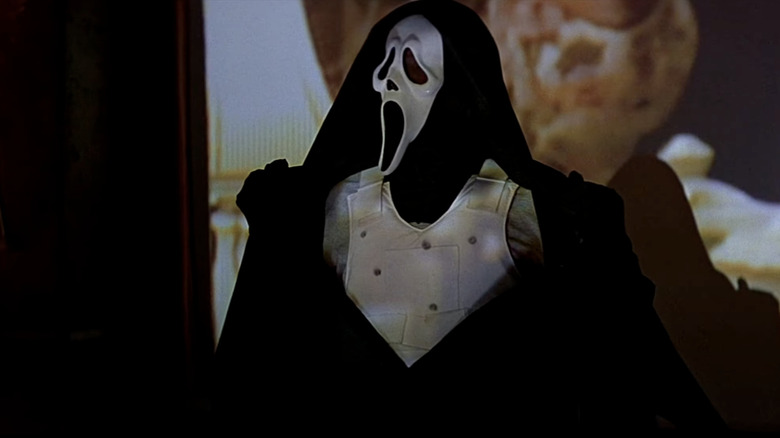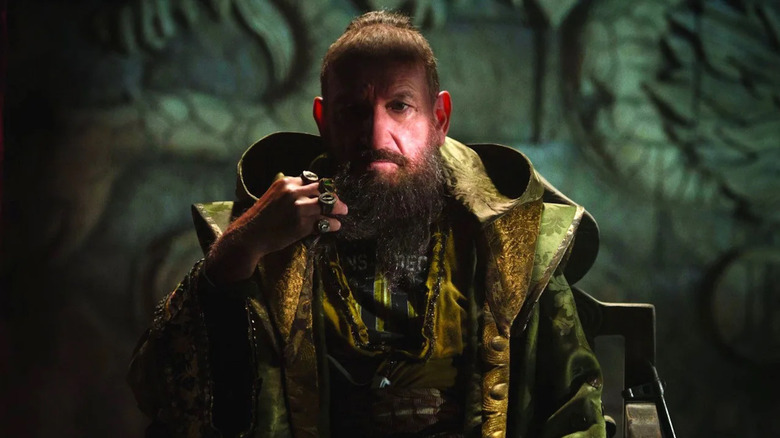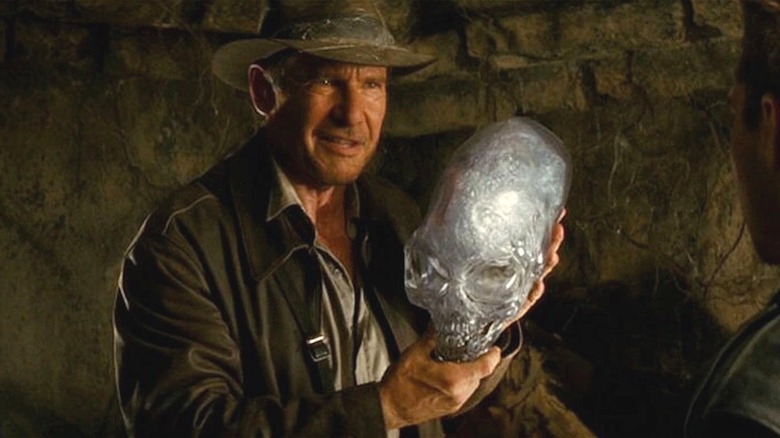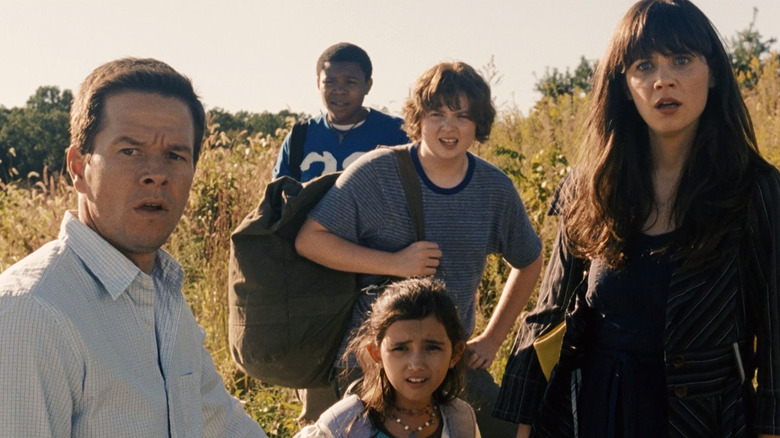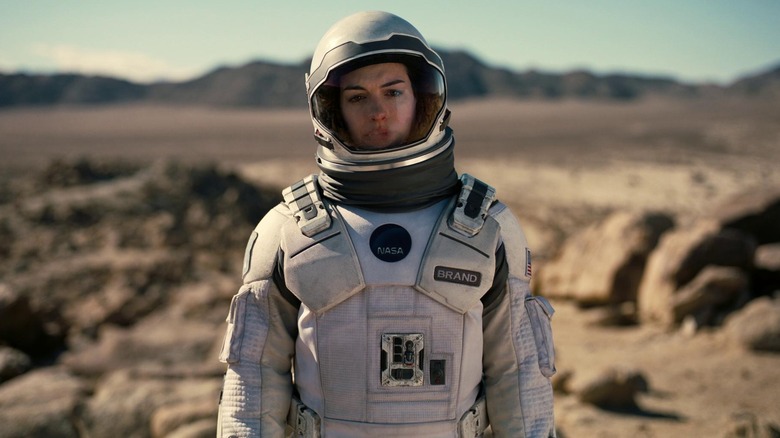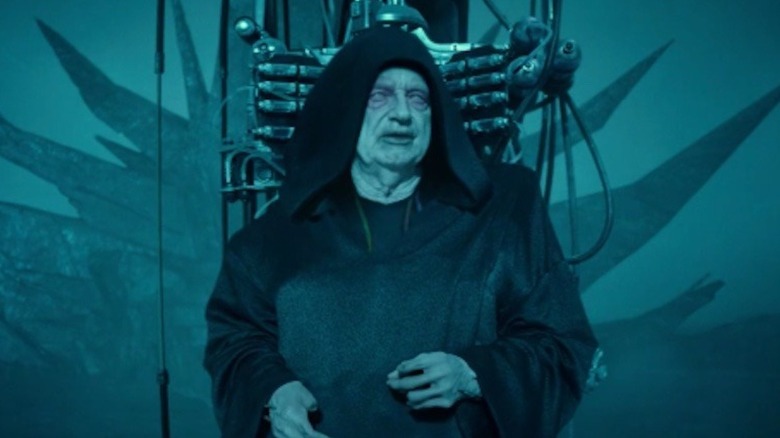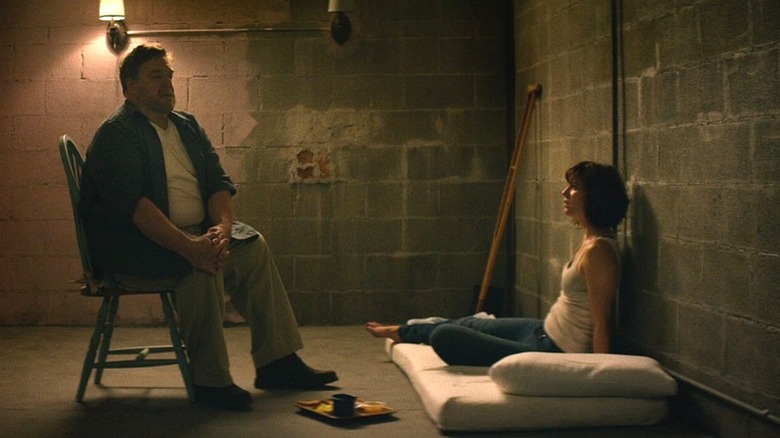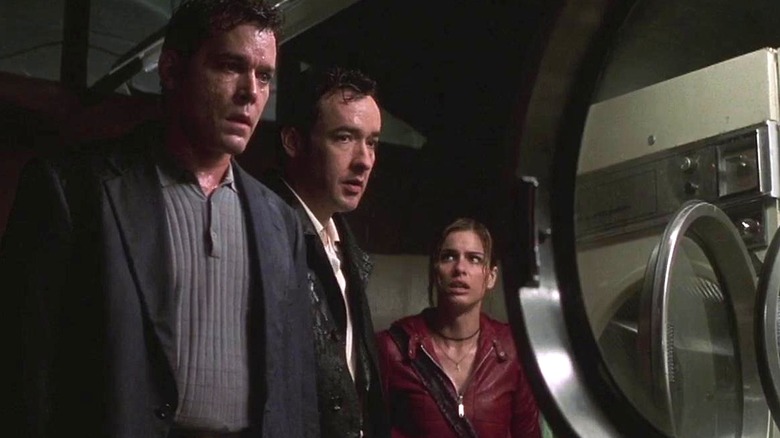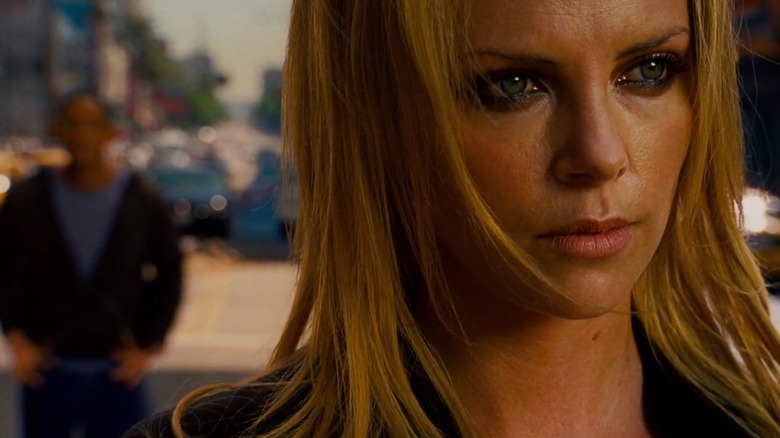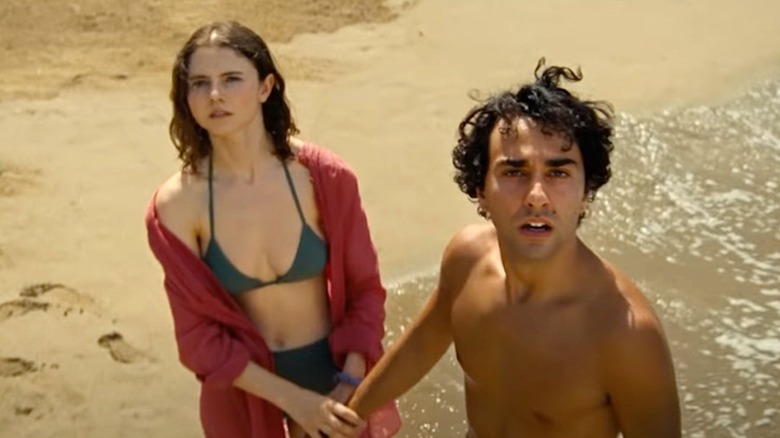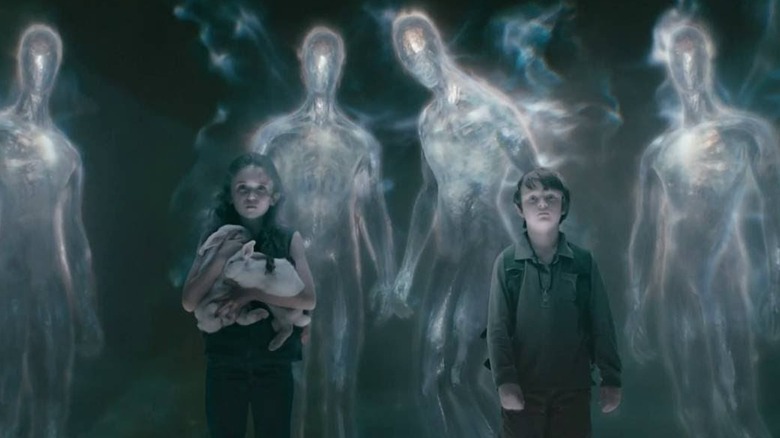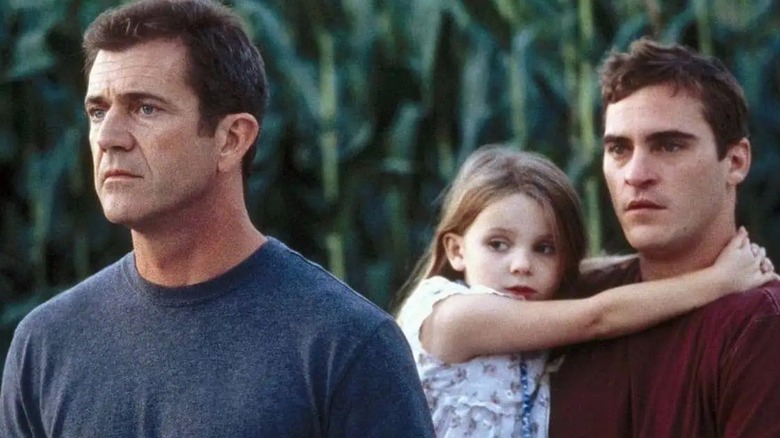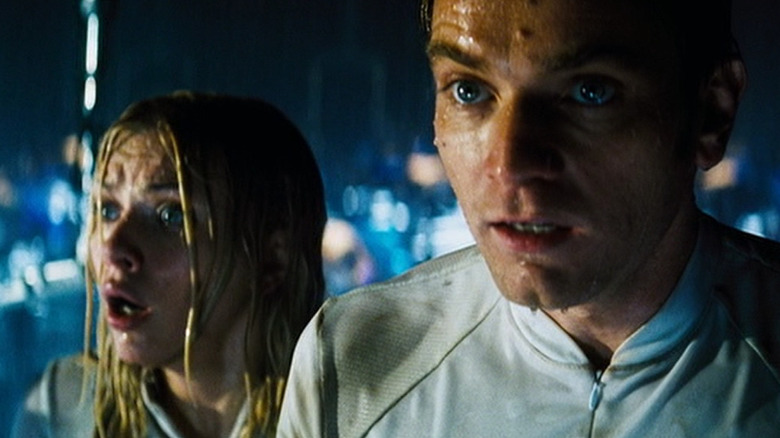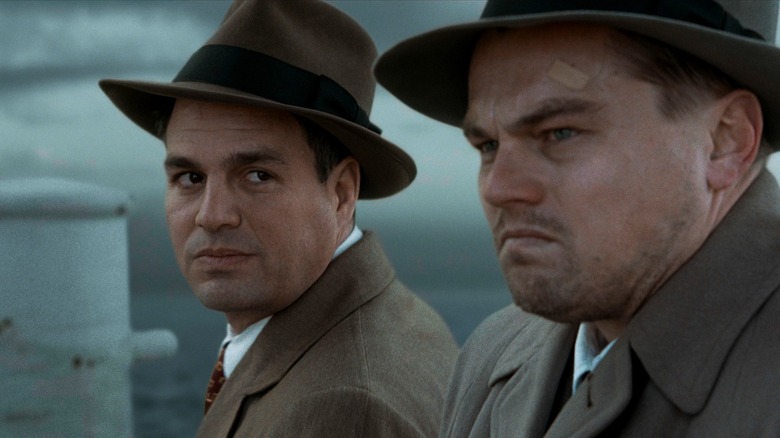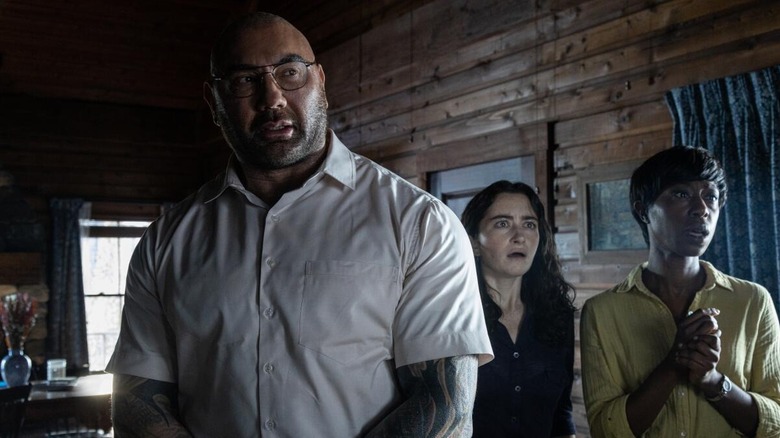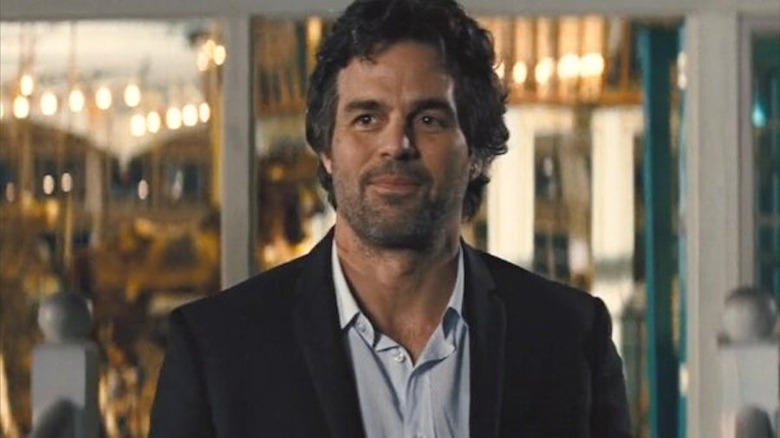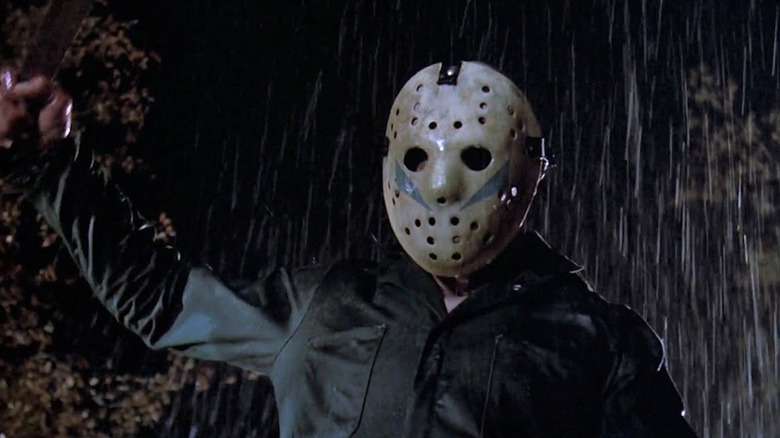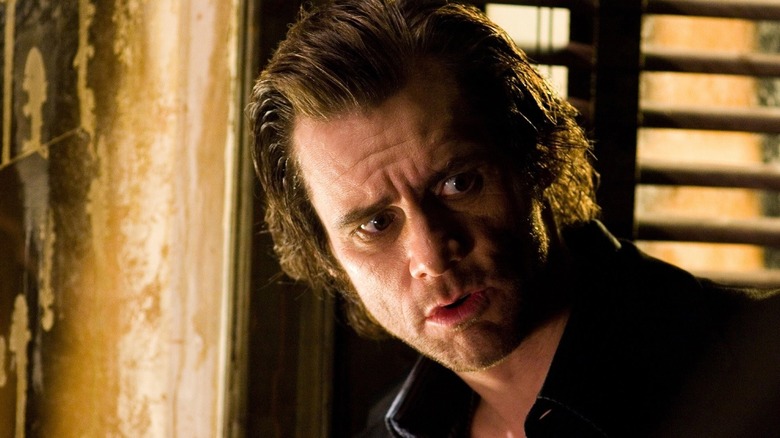Plot Twists That Ruined The Movie
A well-crafted plot twist can take a movie from good to great—in fact, some movies are regarded as classics specifically because of twists that completely recontextualize the story. But sending the narrative in an unexpected direction doesn't always work out, and sometimes it just ends up making a film worse. As great as it feels to be surprised by an excellent plot twist, these movies would have been better off without them. Spoilers ahead!
Remember Me (2010)
There's nothing wrong with a simple romantic movie, and as far as those go, "Remember Me" isn't too bad. Its leads, Robert Pattinson and Emilie de Ravin, are perfectly solid in their roles and have some nice chemistry. And while it may veer into cliché — what romance doesn't, really? — it's never at the expense of its charm. But all of that goes completely and entirely down the drain in the film's final moments, which contain one of the most bizarre, borderline offensive plot twists of all time.
The film has become infamous for its final act, which reveals that the entire story has been leading up to Pattinson's character, Tyler, being in the World Trade Center on September 11, 2001. It's subject matter that should only be handled with the utmost care, and "Remember Me" bungles it badly, taking a horrific tragedy and using it as cheap emotional manipulation. Aside from being deeply insensitive, it's a case of blown potential — this would be an affecting little romantic drama if not for the way it falls apart in its final minutes.
The Village (2004)
The biggest problem with "The Village" is that its twist turns it into a completely different—and much worse—movie. Writer-director M. Night Shyamalan's last-act plot twists helped launch his career, but they ended up becoming notorious to the point of parody—and looking back, "The Village" is where he lost his way.
Marketed as a hybrid horror film and period piece about a small village community in the 1800s, the movie takes place in a forest said to be populated by mysterious monsters, with whom the villagers hold a wavering pact of noninterference. It's actually revealed early on that the creatures don't exist—they're the village elders in costume, trying to scare people into staying. But then there's a second twist—the film actually takes place in the modern day, and the village elders created the monsters to keep their people secluded.
It comes so far out of left field that, in retrospect, there was no way it could ever have hit its mark. The film already had a solid twist, and it was ill advised to further upend viewers' perception of the story's world. It also makes the story needlessly complex, when it was already doing its job perfectly well.
Spectre (2015)
SPECTRE, the villainous organization headed up by the mysterious Ernest Blofeld, served as a narrative thread throughout the Sean Connery Bond films. So when it was revealed that they'd be making their modern debut in 2015's "Spectre," it stood to reason that the film's villain would be Blofeld. Even when actor Christoph Waltz was announced as the film's villain and he insisted he wasn't playing Blofeld, it was easy for fans to put two and two together.
As it turns out, they were right. Waltz was, in fact, playing a new incarnation of Blofeld—but he was revealed to be Bond's adoptive brother, making a surprise return after faking his own death. The twist was superfluous: Blofeld in his original incarnation was a force of pure evil, and he didn't need to be tied to Bond in any way outside of their adversarial relationship to be effective as a villain. Furthermore, the revelation that Bond had a secret brother who ended up orchestrating the events in the previous Craig Bond films strained credibility—it's a twist that twists too hard.
Savages (2012)
Oliver Stone's film adaptation of Don Winslow's novel "Savages" initially seems to end like the book—a final act that tied the story together appropriately, with the death of basically every character providing a sort of nihilistic closure. It also fit in well with the way the storytellers want viewers to see the three main characters—they're too wild for this world, and it only makes sense for them to go out in a blaze of glory.
Unfortunately, Stone added a tacked-on plot twist that screams "A studio executive made us do this!" The kill-'em-all ending is revealed to be a fantasy playing out in the head of Blake Lively's character. Instead, the bad guys get arrested and the good guys get out clean, riding off into the sunset to live happily ever after. The film isn't exactly perfect to begin with, but having the guts to give the audience an ending like the one they see before the twist at least makes sense in the context of a story that's trying to be edgy. The tacked-on happy ending isn't just a cheat—it feels like a painfully safe move.
Planet of the Apes (2001)
It's almost impossible to remake a movie that already has an all-time great plot twist. You can't just repeat it verbatim, you have to make it your own. That's just what director Tim Burton tried to do with his "Planet of the Apes" — problem is, it didn't work.
Burton's "Apes" remake actually features a lot to like. The makeup by Rick Baker is extraordinary, and the big budget allowed for an appropriately massive scale. The problem is its bizarre twist: our protagonist (played by Mark Wahlberg) travels back to Earth through an electromagnetic storm, only to discover that the film's ape villain, General Thade, managed to beat him there by several hundred years and...win the Civil War? Why is he the new face on the Lincoln Memorial, which exists exactly as it does in real life only with an ape head? And why is the Washington Monument unaltered?
There's nothing wrong with an ending that prompts questions, but they should come in response to narrative implications rather than whether the ending makes sense. Burton could have had something special here, but it's undermined by an ending that leaves you baffled for all the wrong reasons.
The Forgotten (2004)
"The Forgotten" starts out with an interesting-enough premise: a mother whose son passed away in a plane crash 14 months earlier wakes up one day to find all evidence of his existence has been erased. Nobody else remembers him, not even his own father, and as she digs deeper into the mystery, she discovers a conspiracy far larger than she could have expected. It's the sort of premise you'd expect to find in a Gillian Flynn book, the kind of perfectly acceptable conspiracy thriller just as approachable for soccer moms as it is for genre enthusiasts.
And then it takes a turn for the weird, with the parties responsible for erasing the son turning out to be aliens, of all things. It upends the film, turning it into a sci-fi story instead of a conspiracy thriller. It also makes little to no sense in the grand scheme of the story. Its implications are never fully realized and nobody has a truly satisfactory response to the revelation that memory-stealing aliens exist. "The Forgotten" could be a fun little thriller, if not for its weird, uncharacteristic twist.
Star Trek: Into Darkness (2013)
JJ Abrams' second entry in the modern "Star Trek" franchise is polarizing, to say the least. The filmmakers stuck themselves with a nearly insurmountable task when they decided to cast Benedict Cumberbatch as a mysterious antagonist who's revealed halfway through "Star Trek: Into Darkness" to be legendary "Trek" villain Khan. The problems with the twist have very little to do with Cumberbatch's performance, or the decision to make Khan the villain. Rather, they stem from the character's identity being a twist at all.
In the established universe of the film, none of the characters have any idea who Khan is. There's a throwaway mention of him being a notorious terrorist from a long time ago, but he's clearly not notorious enough for anyone to remember who he is, given that the crew has to look up that information to begin with. Much of the film's ensuing continuity doesn't stand up well to the slightest scrutiny—it's a twist done entirely for the sake of a momentary reaction from the audience when Khan's name is first said, one with little regard for how it would actually affect the story being told. And it's a shame, because that moment of recognition comes at the expense of a satisfying story.
High Tension (2003)
When crafting a good plot twist, it's incredibly important to consider whether it upends the plausibility of the story. Unfortunately for Alexandre Aja's "High Tension," its Hail Mary of a twist ending—in which the killer is revealed to be a dissociative identity of the protagonist—sends plausibility down the drain. The film, up until that point, is a pretty straightforward (albeit extremely gory) slasher that stands out for being told uncommonly artfully. Its goriness also really can't be overstated. It already has everything horror fans want. So why the needless twist?
It makes very little sense, and it totally upends the continuity and storytelling techniques Aja has utilized up to that point. Shots filmed from the villain's point of view make little sense after the twist, and the film's opening is even more confusing when it's watched while knowing who the killer turns out to be. All this, coupled with the troubling revelation that the protagonist's dissociation is a manifestation of her being in love with her female friend, which is a pretty vile way to depict the way queer people experience love, makes for a bummer of an ending to an otherwise enjoyable horror movie.
Secret Window (2004)
Ever notice how the very real handicap that is dissociative identity disorder has been wantonly sprinkled into an almost impressively large number of horror films, thrillers, and even comedies with very little understanding as to how it actually manifests in real life? If so, you probably had an issue with "Secret Window," and you wouldn't be the only one.
It should be a slam dunk of a movie. Based on a Stephen King short story, it's about a writer named Mort (Johnny Depp in his post-"Pirates of the Caribbean" prime) who retreats to a cabin in the woods to craft his next book, only to be confronted by a deranged stranger named Shooter (John Turturro) who claims Depp's character plagiarized one of his works. Tensions between the two escalate and eventually turn to violence and murder.
The twist, as you can probably conclude, is that Shooter doesn't exist. He's a result of Mort's DID, which—conveniently—has never manifested in the movie until this moment. Sometimes this twist works, but in "Secret Window," it only comes off as uninspired; it's such a coincidence, it derails any suspension of disbelief. "Secret Window" starts off as a pretty engaging thriller. After that, it just feels like a waste of time.
Scream 3 (2000)
The first film in the "Scream" franchise featured a twist that was revelatory in the scope of the horror genre: there were two culprits behind the film's murder spree, not just one. The twist was so good that it was repeated in the sequel, "Scream 2," and it still basically worked. For the third film, though, the filmmakers went with a new twist, and while the need to do something that was both fresh and also relevant in the grand scope of the franchise is understandable, it ended up being a (temporary) franchise-killer of an ending.
Part of the reason the first two films in the franchise were so successful is that they functioned as critiques of the genre—they were self-aware, and skewered the typical tropes that had started to bore audiences. The problem with "Scream 3's" needlessly complicated killer reveal, then, is that it resembles something from the films the franchise started out satirizing.
The revelation that the killer in this film is "Scream" protagonist Sidney's secret half-brother—and that he effectively orchestrated the events of the entire series—is contrived and completely unbelievable. It's a jump-the-shark moment in a franchise that had always scoffed at jumping the shark. It's a shame that movies that made their name on (ahem) killer twist endings closed out their original run with such a whimper.
Iron Man 3 (2013)
The Marvel Cinematic Universe has made its name on the back of big twists, often coming during the post-credits scenes, and the studio usually handles those twists well. But not all of Marvel's big revelations come after the credits, and, arguably, the worst one was revealed during the climax of "Iron Man 3."
Stark's first solo adventure since battling aliens in "Avengers," the threequel sees Iron Man facing off against the henchman of a notorious terrorist leader known as the Mandarin. The classic comics villain was reimagined, ditching the Fu Manchu stereotype and turning him into a Middle Eastern jihadist, played impeccably by Ben Kingsley. It may have seemed like an unorthodox overhaul, but it totally works for the movie, and Kingsley kills it as the frighteningly dedicated terrorist mastermind ... until we learn that he's really Trevor Slattery, a bumbling British actor hired to play the role by the real villain: Guy Pearce's Aldrich Killian.
Probably most famous today for that disappointing twist, the switch-up was so abrupt and disconcerting (not to mention disappointing) that it left a sour taste in audiences' mouths. Even the most diehard MCU fan has to admit it was probably the studio's first major blunder, story-wise, turning the iconic villain into a joke. Thankfully, Marvel eventually wised up, later revealing that the real Mandarin was Xu Wenwu, played by Tony Leung in his first American role. Why Marvel keeps bringing Slattery back — he's next slated to have a major role in "Wonder Man" — is a question we may never have answered.
Indiana Jones and the Kingdom of the Crystal Skull (2008)
The first three "Indiana Jones" movies were long considered one of the greatest movie trilogies of all time. Then, in 2008, they ruined it for OCD sufferers everywhere by releasing a fourth film, "Indiana Jones and the Kingdom of the Crystal Skull." Of course, fewer people would have complained if the movie had been as good as the first three flicks; instead, it was met with a divisive reaction, to say the least — and a big reason it rubbed so many people the wrong way was its disappointing twist.
The film's ending failed to deliver mostly because of how poorly it seems to fit in the context of the larger series. Up to that point, "Indiana Jones" had veered into the supernatural but usually felt grounded in the terrestrial. "Crystal Skull," however, delves into pure science fiction with the introduction of a race of otherworldly, interdimensional aliens.
The mystical elements in the previous films had all been centered on religious themes: demons, angels, and even the Almighty themself, which made sense because Jones was a professor of archaeology who studied and hunted for artifacts with religious significance. This made the existence of real, godlike powers fit with the character and his world. The sudden veering into outer space and other dimensions, though, just doesn't work and feels wholly out of place. To this day, it remains one of the more baffling creative decisions the series ever made, time travel included.
The Happening (2008)
Exploring the dystopian effects of climate change has made for a number of great movies over the years. The 1972 classic "Silent Running," which explored the consequences of environmental catastrophe decades before global warming had hit the zeitgeist, even earned a place on Looper's list of the most underrated sci-fi films of all time. In 2008, M. Night Shyamalan tried his own hand at the genre in "The Happening," but he didn't tell anyone that the movie was part of this compelling subgenre until the very end via a plot twist that made no real sense at all.
A mind-bending thriller, "The Happening" stars Mark Wahlberg and Zooey Deschanel as a young couple caught up in a worldwide hysteria as a series of unexplained mass deaths occur around the globe. It's a taut, nail-biting story where the danger escalates and the tension ratchets up as the situation unfolds, leaving audiences leaning forward in their seats, wondering what the real cause of this devastating mystery might be.
It's plants. Plants did it. Plants killed everyone. That's it, really — the world's plant life has apparently gotten angry at us humans for abusing the planet and is striking back in a vengeful attack on mankind. It's not the worst idea, and done right, it could be a great movie. But the way it plays out — with the twist coming mostly out of nowhere and with so little explanation that makes it seem more like magic than a natural biological response — left most people scratching their heads.
Interstellar (2014)
Director Chris Nolan loves a good twist, and they're usually pretty stellar, starting with the jaw-dropping ender to his studio debut, "Memento." Some have taken issue with the ending to his magic-based thriller "The Prestige," but for our money, his biggest failure when it comes to climactic twists is the conclusion to his sci-fi masterpiece, "Interstellar." Take it away, and you might have one of Nolan's very best films; but with it, the film drops much further down the rankings of Nolan's filmography.
"Interstellar" is set in a not-so-distant future, where Earth is experiencing global famine and all of humanity is in peril. With Earth unable to sustain human life for much longer, astronaut Joseph Cooper (Matthew McConaughey) sets out on an interstellar mission to find a new planetary home thanks to a recently discovered wormhole. The only problem is that, due to time dilation, years will pass on Earth for every few minutes Coop is gone. And as problems mount on the mission, he risks being gone so long that everyone he knows could be dead by the time he returns.
In the end, Coop finds a way back to Earth, but only because of ... the power of love? Yes, that's how it's presented, and it's just as baffling as it sounds. Sure, "Interstellar" is a heartfelt story of love and loss, and in theory it works thematically. The problem is that until that twist, Nolan's entire focus throughout the whole movie is impeccable scientific accuracy. And in the immortal words of Tina Turner — what's love got to do with it?
Star Wars Episode IX: The Rise of Skywalker (2019)
Modern reappraisals of the "Star Wars" prequel trilogy have left many fans celebrating films that were once universally derided. Maybe in 20 years the same will be said of the sequel trilogy, but as it currently stands, the latter two films were utterly rejected by audiences. The third film, specifically, "The Rise of Skywalker," abruptly shifts from a fun, fast-paced adventure to a head-scratching groan-inducer when a long-dead villain inexplicably re-emerges at the film's climax and reveals the real truth — no, we swear, the really real truth — about the hero's origins.
For those living under a rock, the young Jedi Rey (Daisy Ridley) was said to have no nobility in her ancestry; "The Last Jedi" revealed that her parents were simply two anonymous vagabonds who sold her for money as a child. Then, just as "Rise of Skywalker" was reaching its crescendo, we find out that Emperor Palpatine (Ian McDiarmid) has "somehow" returned — and he has a jar of Snokes, too. That's right, the previous over-arching villain (Andy Serkis) was apparently one of a series of cloned puppets.
Oh, and the Empire is back, too, and there are a thousand Star Destroyers hovering above Palpatine's head that he jump-starts with Force lightning. If that isn't all bad enough, we also find out that Rey isn't a nobody after all. Reversing one of the few interesting ideas in "The Last Jedi," we're told that Palpatine is her biological grandfather, forcing us all to imagine the monstrous Sith master knocking boots.
10 Cloverfield Lane (2008)
In 2008, "Cloverfield" took cinemas by storm, merging the concept of the found-footage film with a sci-fi monster movie. With producer J.J. Abrams on board, it was both a thrilling adventure and a terrifying disaster flick. Then, they tried to turn it into a franchise, with the first "sequel" being 2016's "10 Cloverfield Lane," a very different kind of movie that almost didn't seem like it was related to the previous film in its own series. And that's because for the vast majority of the film, it isn't and only reveals itself to exist in the "Cloverfield" universe in the bizarre twist ending.
The film stars Mary Elizabeth Winstead as Michelle, a young woman who finds herself taken captive by a paranoid man named Howard Stambler (John Goodman). He insists that he's keeping her in his basement for her own protection because there's been a massive cataclysm outside that is endangering everyone.
Set almost entirely in one location, "10 Cloverfield Lane" is an effective, chilling thriller about paranoia and isolationism. But the movie wasn't actually a "Cloverfield" sequel at all when it was first written. Paramount scooped the script up, made some minor changes to it, and slapped the "Cloverfield" name on it. One of the biggest changes was the final twist, which comes when Michelle escapes captivity only to discover there's an alien invasion taking place. Suddenly, what was once a paranoid thriller that feels ripe for an ambiguous ending becomes little more than sci-fi schlock, as she's forced to fend off an attack from a hideous monster who arrives in a spaceship.
Identity (2003)
A chilling crime thriller, "Identity" begins in a rural, rain-soaked motel in Nevada, where a group of ten strangers find themselves being hunted by an unseen killer. Scrambling to uncover the murderer's identity as they're being picked off one by one, everyone is forced to gather evidence and form shaky alliances to have any hope of surviving the night. Meanwhile, in a courtroom seemingly far away from the motel, convicted mass murderer Malcolm Rivers (Pruitt Taylor Vince), mere hours away from being put to death for his heinous crimes, is granted a last-minute stay on his execution thanks to new evidence. But how are the two plotlines connected? In a worse way than you thought.
"It was all in their head" is arguably one of the most tired cliches in storytelling. Unless done to perfection, it can deflate all tension and leave audiences rightly feeling like the 90+ minutes they just spent watching a story unfold were a waste of time. But "Identity" manages to not just commit a cardinal storytelling sin by going down that route, with the characters in the motel all being figments of Rivers' imagination, but the story blames it all on him having dissociative identity disorder. Beyond the dated (and, frankly, overused) depiction of this disorder, it's easy to see the twist in this one coming from a mile away. When it's finally revealed, it's hamfistedly hammered home through an excessive use of flashbacks that make you wish you'd never started to watch the movie in the first place.
Hancock (2008)
Superhero movies are normally pretty straightforward: we meet a hero, learn their origins, and they face a deadly threat that cements them as a city's protector. Throw in a love interest and sidekick, and you've got the makings of a global box office smash. "Hancock" was something a little different, though, as an action-comedy starring Will Smith that deconstructed the superhero movie concept with a hero who wasn't really all that heroic.
The only known superhero in the world, thanks to his loud-mouthed, hard-drinking, and downright reckless personality, Hancock (Smith) isn't beloved by the public despite being a super-powered crime fighter. The bulk of the film follows the faulty hero's attempts to rehabilitate his image with the help of PR consultant Ray Embrey (Jason Bateman), and we also learn that Hancock has no memory of who he really is or how he got his powers.
A compelling character study of a complicated hero, "Hancock" ruins its potential greatness by becoming too focused on his mysterious backstory in the back half. Then the movie ends with a twist: Ray's wife, Mary (Charlize Theron), is also an immortal superhero and knows who Hancock really is. And that's it; the movie ends. Maybe if the twist had come a lot earlier, the revelation could have helped us learn more about Hanock as a character, but when it comes out at the end, the only response from audiences is a collective, "Ok ... so what?" It also raises some really confusing questions about Mary herself that are never addressed.
Old (2021)
We've already seen a few M. Night Shyamalan movies on this list, and for good reason. Known as the director who always delivers a twist ending, taking this risky approach to filmmaking that consistently can leave audiences either applauding his subversion of expectations or scratching their heads, asking, "Why?" One of his more recent endeavors, "Old," focuses on a group of beachgoers who happen upon a mysterious cave in which the normal laws of time and space don't seem to apply. Rapidly aging at a rate of years in mere minutes, they're left struggling to escape with their lives from the strange beach's grip before it's too late.
With an intriguing premise adapted from the pages of a well-received graphic novel titled "Sandcastle," "Old" had the potential to be one of Shyamalan's better titles. Unfortunately, the film falls short thanks to its explanation of what causes the beach's otherworldly phenomena, something left open to interpretation in the original comic. Revealed to be a sinister experiment being conducted by a pharmaceutical company, Shyamalan's ending veers into realism after giving off supernatural vibes for the majority of its runtime. It also feels rushed, resolving every loose end all too quickly as the movie races toward the end credits. The movie asks some interesting questions and, like most of the filmmaker's movies, is successfully suspenseful, but the twist just turns it into a joke.
Knowing (2009)
Known for a filmography that runs the gamut of cinema, from cheesy '90s action to thoughtful arthouse drama and everything in between, actor Nicolas Cage has starred in plenty of certified hits and regrettable misfires in his career. 2009's "Knowing" falls somewhere in the middle. Telling the story of Cage's John Koestler, who is somehow privy to an impending cataclysmic event after his daughter, who has begun to hear mysterious voices, uncovers a cryptic, decades-old prophecy. As the final few predictions unfold, we're treated to some of the best disaster scenes ever as far as end-of-the-world movies go. But when it comes time for the final apocalyptic event, which arrives in the form of a solar flare that will wipe out all life on Earth, the film stumbles to the finish line thanks to the final twist to its story.
Throughout "Knowing," Koestler is determined to uncover the truth of the prophecy, which makes use of numerology and puzzles, while he tries to prevent humanity's impending doom. He ultimately doesn't succeed, but there's a silver lining. It turns out the voices that his daughter and countless children across the world have been hearing belong to benevolent aliens who will save a fraction of humanity from extinction. Or are they angels? "Knowing" never bothers to explain, instead opting to throw just enough biblical and sci-fi clues at the audience to muddle it all. While the film certainly deserves props for going all the way and following through with its doomsday promises, its truly divisive twist ending brings it all to an awkward conclusion.
Signs (2002)
Riding a wave of commercial and critical success in the wake of "The Sixth Sense" and "Unbreakable," director M. Night Shyamalan turned to the sky for inspiration for his next project, and "Signs" landed in theaters in the summer of 2002. It follows single father and widower Graham Hess (Mel Gibson) and his family, as well as the world at large, who are plagued by inexplicable crop circles and mysterious incidents manifesting as lights in the sky — only for the strange happenings to progress into a full-blown alien invasion. Left to fend for themselves on their rural piece of land, Hess' family is the audience's window into humanity's existential struggle for survival.
While generally considered by fans to be one of Shyamalan's better works, with a slow-burning story that's packed with drama and truly terrifying scenes, one key moment works against all that in a big way. In a final confrontation between the Hess family and their otherworldly invaders, it's revealed that the aliens have an Achilles heel that just so happens to be found on the majority of planet Earth: water. It's a bit far-fetched to believe that an alien civilization advanced enough to launch a full-scale invasion would crumble against such an obvious threat, but that's what we got. That, coupled with a generally rushed approach to wrapping up the film, means that "Signs" is a potentially great project blighted by a rough final twist.
The Island (2005)
Directed by Michael Bay, "The Island" is probably more infamous than famous, with a number of odd elements that make it more of a curiosity than an entertaining movie. It became notorious for containing footage that was reused in another Michael Bay movie, and it still raises eyebrows years later for giving away the movie's biggest plot twist in the trailer. But somehow, despite it being spoiled before a single person ever entered the theaters, that twist still manages to ruin the movie.
More than just a bombastic, over-the-top popcorn movie that Bay fans might be used to (but it's also that), "The Island" is an attempt by the director to explore a more thought-provoking, dare we say cerebral, story. It introduces us to a strange near-future where an isolated population lives in an antiseptic society. Like sci-fi classics "Fahrenheit 451" or "THX 1138," the film ponders the roles that society assigns to its people and whether anyone can really break free.
The twist is that the entire population is just a group of clones created to be used as organ donors for the rich. Putting aside that this was spoiled in the trailer, the movie is so by-the-numbers and the script so predictable that any reasonably intelligent person can figure it out long before the characters do. In fact, it's so patently obvious what's going on that one almost begins to feel like it must be a bait and switch. So when the twist is officially revealed, it ruins any kind of tension that could have existed.
Shutter Island (2010)
Director Martin Scorsese has a legitimate claim to the title of Greatest Director of All Time. He's responsible for some of the greatest movies ever made, for certain, with classics in his filmography including movies like "Taxi Driver," "Goodfellas," and "Raging Bull." Unfortunately, 2010's "Shutter Island" isn't one of his all-time greats. Set in 1954, the film stars Leonardo DiCaprio as US Marshal Teddy Daniels, who travels to the enigmatic Shutter Island to investigate the disappearance of a patient at the Ashecliffe Hospital for the Criminally Insane.
There are a number of extremely satisfying twists and turns throughout "Shutter Island," which is why the final one is such a letdown. An otherwise ordinary crime drama that shifts into a psychological thriller, the film presents a captivating mystery that unfolds methodically. As the plot progresses and viewers are drawn onto the literal edges of their seats wondering where it's going next, the only thing left is for the ending to leave their jaws on the floor in disbelief. But while the film did just that, it wasn't in the way that Scorsese was probably hoping for.
From the discovery of illegal experiments being conducted on patients to disturbing flashbacks to the horrors of the Holocaust when Teddy served in the war, "Shutter Island" reaches a crescendo during a confrontation in a lighthouse. Then, we learn the entire movie took place in Daniels' head; he's really Andrew Laeddis, a man who has created a false reality for himself after inadvertently killing his wife. Nothing that we saw in the preceding 2 hours happened or mattered.
A Knock at the Cabin (2023)
It's clear that M. Night Shyamalan has a problem with plot twists, as this is his sixth film on this list; that's not great for a director best known for ending his movies with a big, story-changing revelation. In "A Knock at the Cabin," we meet a family spending some time alone in a remote cabin when four strangers arrive and take them prisoner. These people believe that the end of the world is coming, and, to stop the literal apocalypse, someone in the family must die.
It's a chilling setup, but the ending is anything but. In fact, it's a lot like "10 Cloverfield Lane," where much of the film is spent exploring the question of whether the antagonists are telling the truth or whether they've simply gone violently mad. And, like the latter film, "A Knock at the Cabin" turns on a dime when the plot twist reveals that, yes, the end of the world is upon us and someone must die to stop it.
The problem here is that it's really not much of a twist at all. It's actually something of a reverse twist, with the ultimate revelation being that the plot plays out just as the characters said it would. While it may have been a surprise to some, the whole thing just unfurls like a wet blanket and falls to the floor with a deep thud.
Now You See Me (2013)
What's amazing about our next entry is that not only do most fans agree the twist ruined the rest of the film, but the movie still got two sequels. Released in 2013, "Now You See Me" stars Jesse Eisenberg, Isla Fisher, Woody Harrelson, and Dave Franco as The Four Horsemen, a group of illusionists and tricksters who perform as stage magicians but are also a group of infamous thieves and bank robbers. Mark Ruffalo stars as FBI Agent Dylan Rhodes, who has been trying to gather evidence against the miscreant magicians to bring them to justice.
A pretty simple story, "Now You See Me" plays like a Marvel movie without superpowers: part drama, part comedy, part action, part mystery, all executed with style and panache. But while the bulk of the movie plays out well, engaging audiences with clever capers, fast-paced chase scenes, and nail-biting escapes, the ending risks collapsing the entire story in on itself. Near the end of the film, we learn that Rhodes — who has been hot on the tail of the Horseman through the entire film — is actually a member of their team, and his pursuit was all part of some elaborate scheme.
It's not a bad twist, per se, and with some minor revisions, it could have been satisfying or even mind-blowing. But as it is, the twist is so abrupt, so haphazard, and so lazily done – with few noticeable clues to suggest it like a good thriller should have — that it just feels like it was tacked on when the writers couldn't think of something better.
Friday the 13th Part V (1985)
One of the most iconic franchises in all of horror, "Friday the 13th" is also one of the most bizarre. Starting with a standard slasher flick way back in 1980, the collection of films transformed into a series that saw silent killer Jason Voorhees go everywhere from summer camp to the streets of Manhattan to outer space. He even battled rival slasher Freddy Krueger via some multiverse shenanigans before the MCU made that type of franchise crossover cool. But before the series truly went off the rails, it tried to do something a little different that just didn't work out.
Following the events of the previous film, 1985's "Friday the 13th: The Final Chapter" (which obviously wasn't the final chapter), "Part V" sees Tommy (John Shepherd) still reeling from his run-in with Jason, in which he dealt a killing blow to the monster. Though the bloody battle came at the price of his mental health, he finally put a stop to the masked killer's reign of terror. Or did he?
Soon enough, the bodies start to pile up, and it's revealed that, somehow, Jason has returned, Palpatine-style, to kill again. Except he hasn't; it's actually a grieving father who has taken on the Jason persona and is hellbent on getting revenge for the death of his son. It's a convoluted twist out of left field that hasn't sat right with fans since the film debuted. While taking risks and trying something new should be cause for praise for most long-running series, for "Friday the 13th," it was just a failure.
The Number 23 (2007)
Though thought of primarily as a comedy actor, Jim Carrey is no stranger to more serious films, with titles like "The Truman Show" and "Eternal Sunshine of the Spotless Mind" being some of his career highlights. Unfortunately, the 2007 thriller "The Number 23" isn't exactly one of them. Carrey plays Walter Sparrow, a man whose life is turned upside down after he's consumed by "The Number 23," a novel that bears striking similarities to his own life, the eeriest of which being the real unsolved killing of Laura Tollins (Rhona Mitra). A tale of whodunnit murder and conspiracy, the only mystery here is just how the movie wound up ending so terribly.
Though it gets off to a genuinely intriguing start, problems quickly arise well before the unsatisfying end twist. The film is clunky, hard to follow, and at times genuinely difficult to watch thanks to the liberal use of an oversaturated palette, but there's one narrative twist that could have saved it all. Sparrow's obsessive pursuit of the truth leads him to believe his wife, Agatha (Virginia Madsen), the person who gave him the book in the first place, is behind the grisly crime. Instead, however, we soon discover that it was Sparrow himself who murdered Laura, ultimately writing the book himself as a twisted confession for his crime before losing his memory. It all amounts to a meandering mess that could've been saved with some changes to the final plot twist, which only makes "The Number 23" all the more frustrating.
Beau Is Afraid (2004)
Arguably one of the most dynamic actors in modern cinema, starring in everything from blockbuster films like "Gladiator" to more arthouse titles like 2013's "Her," Joaquin Phoenix is no stranger to unique projects. That's why when word got out that he'd be the leading man in a new film from indie studio A24, cinema buffs had plenty to be excited about. Unfortunately, it wound up being a more middling final product that stands in stark contrast to the home runs usually associated with the studio, due largely in part to its overindulgence in the absurd that comes to a head with a truly bizarre ending.
Set at the crossroads between reality and fantasy, "Beau is Afraid" follows Beau Wassermann (Phoenix) as he attempts to solve the mystery of his late father's passing, a puzzle that has haunted him since childhood. He hopes the key to the truth will be found by confronting his mother, with whom he maintains a tenuous relationship, leading him on a journey through his own mind and the unexplained to reach her. But the answer he seeks only leaves him, and the audience, with more questions than answers.
It turns out Ben's father never actually died and has instead been kept prisoner by his mother all these years. Oh, and instead of a human being, his dad is a monstrous, phallic-shaped creature. It's a lot to unpack, and audiences have come up with plenty of different interpretations, but the twist ending ultimately proved to just be a step too far into wacky storytelling.
